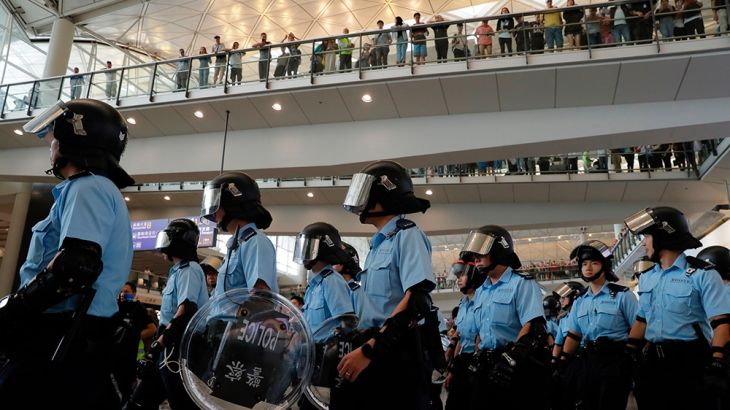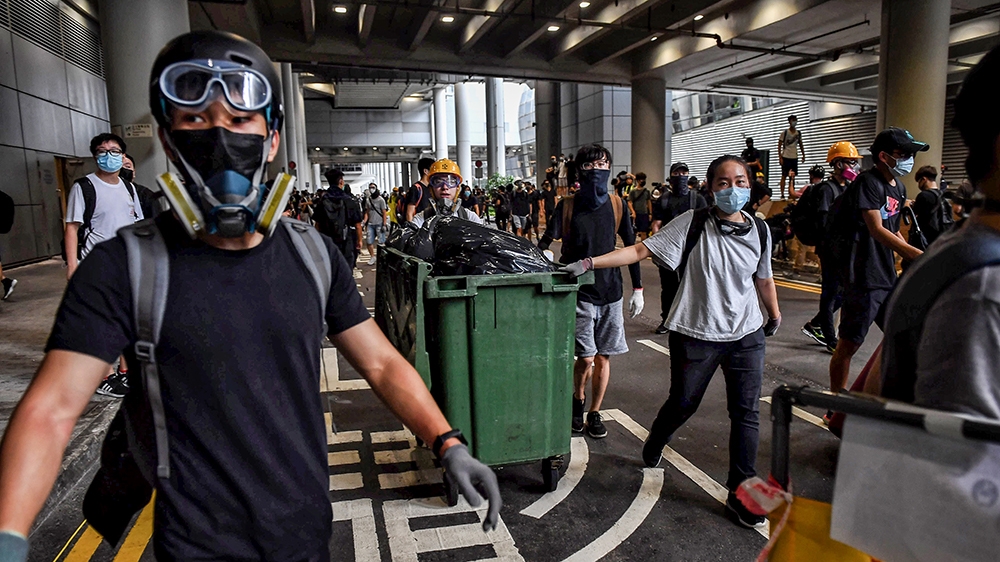Protesters disrupt Hong Kong airport links as unrest deepens
Authorities suspend trains to airport as protesters keep up pressure after night of heavy clashes with police.

Pro-democracy protesters in Hong Kong are seeking to disrupt transport routes serving the city’s international airport, as the territory’s months-long political turmoil deepens.
Trains to the airport were suspended and traffic was congested after protesters urged the public to overwhelm road and rail links to the facility on Sunday, a day after the city was rocked by some of the most intense violence in months.
Keep reading
list of 4 itemsThe Take: Where are Hong Kong’s protesters now?
Hong Kong’s new security law comes into force amid human rights concerns
Hong Kong passes tough new national security law
Thousands of demonstrators surrounded entrances to the airport on Sunday afternoon, before dispersing following a police intervention.
“There was no violence. Police did not use batons or tear gas. They simply charged towards the protesters, who dispersed in different directions as a result,” Al Jazeera’s Sarah Clarke, reporting from the airport, said.
“Nevertheless, the protesters achieved what they wanted at this stage, which is a transport chaos.”
Clarke said the two main entrance points to the airport – road and railway – were both experiencing “major problems”.
The protesters ave used burning barricades to block roads near the airport, while the express train and some bus services to the travel hub on the outlying island of Chek Lap Kok were suspended. Some passengers walked to the airport carrying their luggage.
Flights were not disrupted, while riot police were present inside the terminals. The airport is covered by an injunction prohibiting protesters from entering in the wake of a shutdown last month which forced the cancellation of hundreds of flights and ended in ugly clashes between police and demonstrators.
Meanwhile, a notice posted at train stations by the Mass Transit Railway operator said services had been suspended, a move “requested by the Hong Kong Government and Airport Authority to facilitate access control arrangements at the airport.”
The protest movement was triggered in June by a proposed bill that would have allowed extraditions of suspects to mainland China.

The draft law has since been shelved but the protests have continued amid concerns Beijing was planning to erode the autonomy granted to the city when it was handed back to China from Britain in 1997.
The demonstrators’ five main demands include the right to elect officials and the resignation of Beijing-backed Chief Executive Carrie Lam.
China, which denies meddling in Hong Kong’s affairs, has denounced the protests and warned of the damage to the economy.
Subway video
On Saturday, thousands of protesters took to the streets for a 13th consecutive weekend, in a mass march that ended with clashes with police who fired tear gas and water cannon.
Black-clad demonstrators, some carrying crosses, had gathered at a sport stadium in Hong Kong’s city centre, before fanning out into the streets, marching towards the police headquarters in central Wan Chai and clashing with police.
Late at night, a video from Hong Kong broadcaster TVB showed police on the platform of Prince Edward subway station swinging batons at passengers who backed into one end of a train car behind umbrellas.
The video also shows pepper spray being shot through an open door at a group seated on the floor while one male adult holds up his hands.
|
|
During Saturday’s protests, officers fired two warning shots in the air to scare off a group of protesters who had them surrounded and were trying to steal their pistols, the police said. It is only the second time live rounds have been used in more than three months of unrest.
“A large group of protesters participated in unlawful assembly in various districts since yesterday, despite police’s objection and warning,” the police said in a statement.
“The level of violence is rapidly escalating and their illegal acts have no regard to the laws of Hong Kong.”
The march came as police ramped up a crackdown, with police detaining three legislators hours after arresting several prominent activists including Joshua Wong, one of the leaders of the 79-day Umbrella Movement in 2014.
Wong, who was charged with organising an unlawful assembly in June, was released on bail.
The latest protests, which at one point blocked three key roads, came on the fifth anniversary of China’s decision to curtail democratic reforms and rule out universal suffrage in Hong Kong.
Hong Kong returned to China under a “one country, two systems” formula that allows it freedoms not enjoyed on the mainland, such as the right to protest and an independent legal system.
